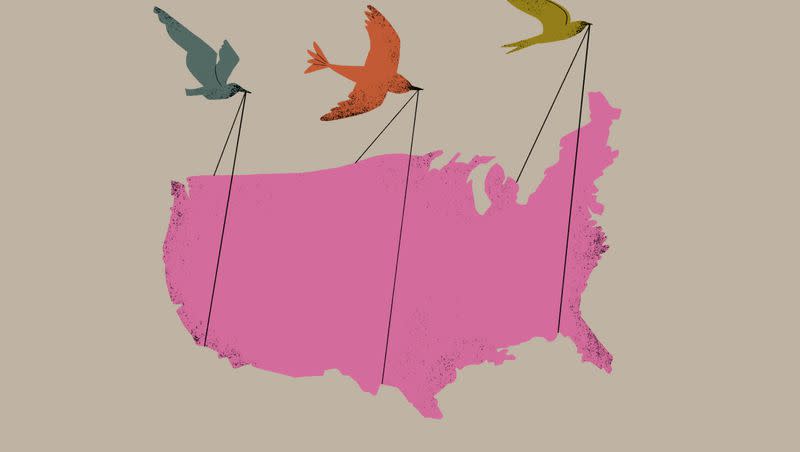Perspective: Latter-day Saints have a distinct charge to uphold the Constitution

- Oops!Something went wrong.Please try again later.
- Oops!Something went wrong.Please try again later.
In early July 1787, the delegates who gathered in Philadelphia to create a written constitution for the new nation faced the real prospect of failure. Yet by mid-September, they had produced the charter that would be the basis for our enduring success as a nation.
In his letter transmitting the Constitution to Congress, George Washington attributed this surprising turn of events — what one popular account of the convention called the “Miracle at Philadelphia” — to the “spirit of amity, and of that mutual deference and concession which the peculiarity of our political situation rendered indispensable.”
Our current political situation — fraught with division and partisan politics — renders indispensable those same qualities.
Constitutional law scholar Derek Webb explored what Washington meant in a brilliant article that points out that the delegates to the Convention exhibited not only civility in their debates — a good first step — but more important still, they were willing to set aside parochial interests, come to a compromise, and in some instances even give up cherished liberties for the sake of unity.
In other words, the “miracle of Philadelphia” was not a deus ex machina. It came about only because people made an effort to understand one another and were willing to give up some things they valued dearly for the sake of unity. This is the road map for overcoming division — for achieving the miracle.
This idea was captured in a major address delivered by President Dallin H. Oaks of the First Presidency of The Church of Jesus Christ of Latter-day Saints, titled, “Defending Our Divinely Inspired Constitution.” In his remarks, President Oaks offered the most elegant explanation I have seen in my years of studying the Constitution of what is required for citizens in general — and Latter-day Saints in particular — to heal this divide. “On contested issues,” he taught, “we should seek to moderate and to unify.”
Related
In that straightforward and simple directive, President Oaks captured the animating spirit that created the United States Constitution in 1787. And, without it today, the Constitution will not long survive.
As the late Michael Gerson noted, “Our political system is designed for vigorous disagreement. It is not designed for irreconcilable contempt. Such contempt loosens the ties of citizenship and undermines the idea of patriotism.”
That is why it is so troubling that in our current political moment, contempt has replaced disagreement. And this contempt, Arthur Brooks observes, is “ripping our country apart. ... Political scientists have found that our nation is more polarized than it has been at any time since the Civil War.” NYU social psychologist Jonathan Haidt warns, “There is a very good chance American democracy will fail, that ... we will have a catastrophic failure of our democracy. ... We just don’t know what a democracy looks like when you drain all trust out of the system.”
What does it mean to “support and defend” the Constitution in this environment?
At the very least, it means that we will “support and defend” the rights protected by the Constitution and the structure of government it creates. But it means much more than that. It means we will “support and defend” the values that gave life to the process by which the Constitution was created. Compromise for the sake of unity is the animating spirit of the Constitution, and it is every bit as vital to its preservation in this moment of toxic political polarization as it was in the summer of 1787.
President Oaks has given us a template for how to do that. His template may surprise some. We are not to be culture warriors. Rather, we are to be people who are building bridges of understanding across partisan divides. That is our standard. It brings to mind the scene from the television series “The Chosen” in which Peter, surprised by Jesus’ actions, remarks, “This is different!” To which Jesus responds, “Get used to different!”
Our national motto is E Pluribus Unum. Out of many, one. We are the United States of America. The Constitution calls us to unity. And Latter-day Saints in particular have a unique role to play. We are called to work for at-one-ment in all our relationships — not just between an individual and God or within families, but also between people whose political disagreements have turned into contempt for one another. That is hard work, to be sure, but as Susan W. Tanner, the former Young Women general president of The Church of Jesus Christ of Latter-day Saints, once taught: We can do hard things.
Thomas B. Griffith is a former judge on the U.S. Court of Appeals for the D.C. Circuit. He served as the nonpartisan legal counsel to the U.S. Senate. He is a fellow of the Wheatley Institute.
Editor’s note: For years the Deseret News’ editorial page carried the epigraph: “We stand for the Constitution of the United States as having been divinely inspired.” During the month of September, the Deseret News will publish a variety of articles examining the Constitution’s continued importance. A modified version of this article appears in the fall 2023 BYU Humanities magazine.

